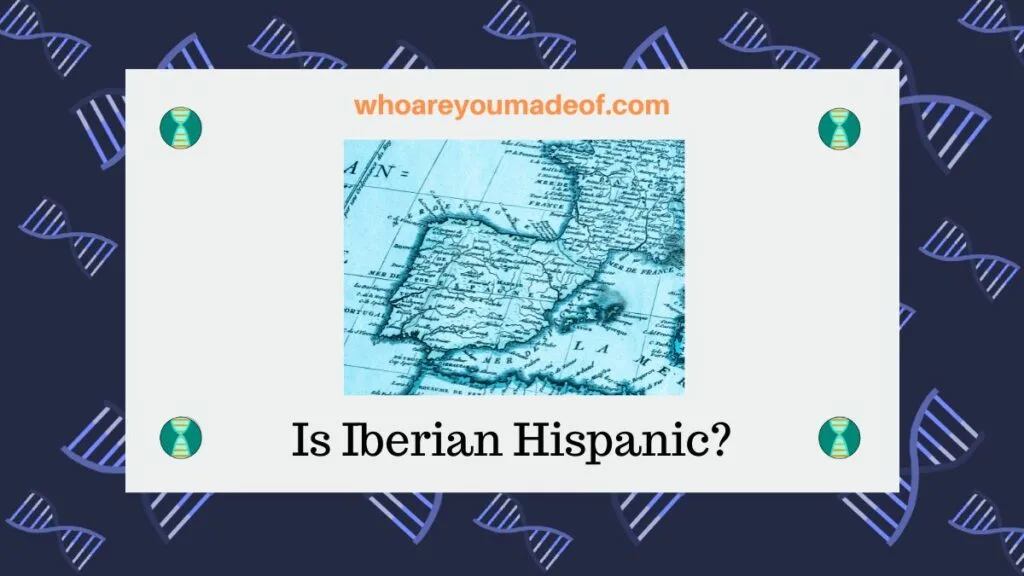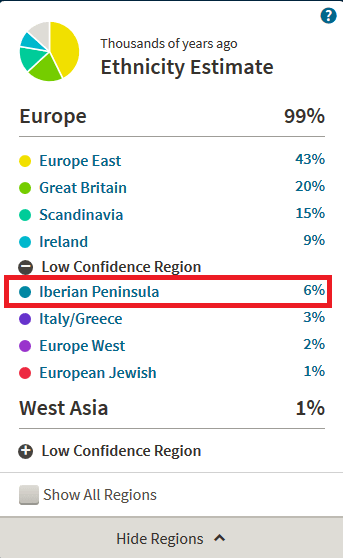Are you curious about whether Iberian is Hispanic? Did you do a DNA test and saw something called “Iberian Peninsula” on your DNA results?

Does this mean that you are Hispanic? No worries, this is a super common question, and in this post, we will discuss the meaning of Iberian vs. Hispanic.
What does Hispanic mean? Is Iberian Peninsula Hispanic?
The simple answer is that technically, according to the commonly accepted definition of Hispanic, yes. Iberian can often mean Hispanic.
The definition of Hispanic:
- Something that is related to Spain or other Spanish-speaking countries (adjective) OR
- Someone who speaks Spanish and lives in the United States, and less commonly, a different Spanish-speaking country – often used to describe someone of Latin American descent (noun)
Many people who fit the description above and are descendants of people from Latin American Spanish-speaking countries, including what was known as New Spain (and later, Mexico) may prefer to be referred to as Latino/a, Afro-Latino/a, Chicano/a, or Latinx. It is important to note that Latin America is a very large, diverse geographic region, and its people and their descendants have a variety of cultural identities.
We should also mention that not everyone with Latin American ancestry identifies as having an Hispanic ethnicity. There are hundreds of indigenous groups throughout North, Central, and South America that have had limited influence from Spain and the Spanish language.
This is illustrated by the tens of millions of people who live in Latin America who collectively speak hundreds of indigenous languages.
So What Does It Mean to Be Iberian?
If you have Iberian in Your DNA, then it is likely that, at some point in history, you have ancestors that came from the Iberian Peninsula. How far back?
It depends on your family history. You could have really small amounts from lots of different ancestors really far back, or you could have larger amounts from a couple (or just one!) ancestor just a few generations back.
Whether or not you would decide to “call yourself” Iberian would be completely up to you, and would probably depend on whether or not you could trace your family tree back to the Iberian Peninsula, how far back your “original” Iberian ancestors are in your tree, and how connected you feel to the Iberian cultures.
How can I find out if I am Iberian?
The best way to find out if you had Iberian ancestors is to take a DNA test and build a family tree. There are many DNA testing companies that can estimate where your ancestors likely lived, and your DNA results can help you build a family tree.
Ancestry DNA will tell you how much Iberian you have in your DNA, but it will display on your results under one of the 32 regions and sub-regions of the Iberian Peninsula. Currently, these regions and communities are under the main regions of Portugal, Spain, Basque, and France.

Other DNA companies also test for the Iberian Peninsula regions, including Family Tree DNA and 23andMe. In addition, MyHeritage currently tests DNA for 154 Genetic Groups located on the peninsula.
Note: Ancestry no longer reports the more general “Iberian” category in DNA results. Instead, they have now been able to isolate more specific countries within the Iberian region. You might be interested in my post, “What happened to my Iberian Peninsula DNA?”
Why do I have Iberian in my DNA results?
(Read this article for more information about the Iberian Peninsula DNA and how it might have gotten into your DNA!)
People who have at least one parent who was born in, or descends from, a Latin American country (think South America, Central America, and Mexico) are very likely to have at least a small amount of Iberian Peninsula show up in their DNA results.
It is also important to remember that a very large part of the United States was part of Mexico/Spain for centuries, and many people who live in that part of the country are descended from those people whose families have always lived there and many mixed with Spanish (from Spain) colonizers at some point.
All of the southwest US states were part of the Viceroyalty of New Spain, which was essentially the Spanish empire, for about 300 years.

Can you be Latino and not Iberian?
This is a great question. My husband was actually born in Mexico.
He shows only 1% Iberian DNA, which surprised me very much. I know another person whose father is Mexican, and she has only 3% Iberian peninsula DNA.
This leads me to assume that you can most definitely be Latino and not Iberian. There has been immigration to Latin American countries from all over the world, including from many European countries that are NOT Spain or Portugal.
Can I be Iberian and not Latino?
If you have Iberian DNA show up in your ethnicity, does it mean that you have Latino ancestors? Not necessarily!
There are many explanations as to why you might have Iberian DNA. To answer this question more completely, you will have to start building your family tree, using your DNA results as a guide.
Make sure that your family tree matches your DNA results.
Conclusion
This has been a basic explanation of the meaning of Iberian/Hispanic, how you might have inherited Iberian DNA, and how to find out if you have Iberian in your family tree. I have a lot more in-depth information on this site, so feel free to browse the site.
If you have any questions or comments, please leave me a comment! Thank you for stopping by.

Pedro
Saturday 17th of June 2023
Portuguese people are NOT Hispanic, they are Lusitanian… this is a fact!
Tomas
Saturday 17th of June 2023
Portugal is not Hispanic. Portugal is Lusitanic, which is quite different. Hence the term “luso” to also refer to Portuguese people.
Amad Thibodeau
Saturday 22nd of April 2023
Hello “I have 11.8 % Iberian 1.1 Italian and 1.9% European DNA Coming from My heritage" Which shows matching relationship w/ 4th cousins from meso-america! One of my Matches listed as born in “Puerto Rico" Does this mean I have Mexican relatives or could mean I have Mexican or Hispanic ancestors?
Nick
Tuesday 19th of April 2022
The Iberian peninsula also includes Portugal. These people are NOT considered Hispanic nor are their descendents in Brazil.
Kina
Tuesday 5th of July 2022
@Nick, Portugal is part of the Iberian peninsula and the Iberian peninsula is Hispanic. US Congress can’t pass a law (like they did in 1976 ) and decide a person’s heritage. However, that has been a hot topic in the Portuguese community for years. Some are quite happy to have Portugal separated out.
Ronald Sena
Monday 28th of June 2021
My DNA results say I am 29% Iberian ,52% mesoamercan,the rest is mixed European.my great grand mother is 100% Apache,why wasn't that found in my dna.??